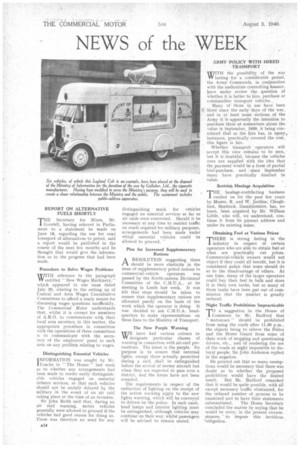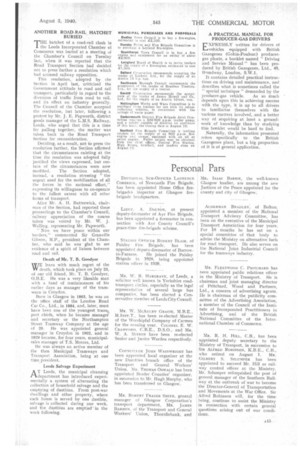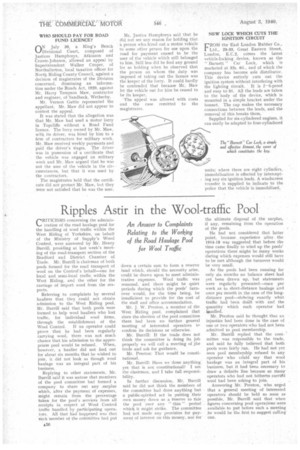NEWS of the WEEK
Page 16

Page 17

Page 18

If you've noticed an error in this article please click here to report it so we can fix it.
REPORT ON ALTERNATIVE FUELS SHORTLY
THE Secretary for Mines, Mr. Grenfell, having referred in Parliament to a statement he made on June 18, regarding the use for road transport of alternatives to petrol, said a report would be published in the course of the next few months and he thought that would give the information as to the progress that had been made.
Procedure to Solve Wages Problems WITH reference to the paragraph W entitled " New Wages Machinery," which appeared in our issue dated July 20, relating to the setting up of Central and Area Wages Consultative Committees to afford a ready means for ' discussing wages questions unofficially, The Commercial Motor understands that, whilst it is correct for members of A.R.O. to communicate with their local area secretary in this matter, the appropriate procedure in connection with the operations of these committees is to communicate with the secretary of the employers' panel in each area on any problem relating to wages.
Distinguishing Essential Vehicles INFORMATION was sought by Mr. ITouche in "The House " last week as to whether any arrangements had been made to render easily distinguishable vehicles engaged on essential defence services, so that such vehicles should not be unduly delayed by the military in the event of an air raid taking place at the time of an invasion.
Sir John Reith said that, during an air raid warning, motor vehicles generally were allowed to proceed if the vehicles had good reason for doing so. There was therefore no need or any distinguishing mark for vehicles engaged on essential services so far as air raids were concerned. Should it be necessary at any time to restrict traffic on roads required for military purposes, arrangements had been made under whieh essential vehicles could be allowed to proceed.
Plea for Increased Supplementary Rations
A RESOLUTION suggesting there /-1. should be more elasticity in the issue of supplementary petrol rations to commercial-vehicle operators was passed by the North-eastern Divisional Committee of the C.M.U.A., at its meeting in Leeds last week. It was felt that steps should be taken to ensure that supplementary rations are allocated purely on the basis of the work which the operator is doing. It was decided to ask C.M.U.A. headquarters to make representations on these lines to the Ministry of Transport.
The New Purple Warning
WE have had various colours to designate particular classes of warning in connection with air-raid precautions. The latest is the purple. Its purpose is to ensure that external lights, except those actually permitted -during a raid, shall be extinguished before the arrival of enemy aircraft but when they are expected to pass over a district, and the sirens have not been sounded.
The requirements in respect' of the extinction of lighting on the receipt of the action warning apply to the new lights warning, which will be conveyed to drivers by the police. In such cases, head lamps and interior lighting must he extinguished, -although vehicles may continue on their way, whilst passengers will be advised to remain seated.
ARMY POLICY wax HIRED TRANSPORT
WITH the possibility of the war W lasting for a considerable period, the Army Commands, in conjunction with the authorities controlling finance, have under review the question of whether it is better to hire, purchase or commandeer transport vehicles..
Many of those in use have been 6. hired since the early days of the war, and in at least some sections of the Army it is apparently the intention to purchase these at somewhere about the value in September, 1939, it being considered that • as the hire has, in many. instances, practically covered the cost, this figure is fair.
Whether transport operators will accept this view remains to be seen, but it is doubtful, because the vehicles were not supplied with the idea that the payment would be a form of partial hire-purchase, and since September many have practically doubled in value.
Scottish Haulage Acquisition
Thaulage-contracting business carried on for the past few years by Messrs. R. and W. Jardine, Cleughfoot, Beattock, Dumfriesshire, has, we learn, been acquired by Mr. William Little, who will, we understand, continue it from its present address and under its existing name.
Obtaining Fuel at Various Prices
THERE is strong feeling in the I industry in respect of certain operators who are able to obtain fuel at what are practically cut prices. Commercial-vehicle owners would not object if they could all benefit, but it is considered unfair that some should do so to the disadvantage of others. At one time, many of the larger operators could buy their fuel in bulk and store it in their own tanks, but so many of these tanks have been put out of commission that the number is greatly reduced,
Night Traffic Prohibition Impracticable
TO a suggestion in the House of Commons by Mr. Radford that " motorcars " should be prohibited from using the roads after 11.30 p.m., the objects being to relieve the Police and the Home Guard from some of their work of stopping and questioning drivers, etc., and of rendering the use of the roads at night impossible to disloyal people, Sir John Anderson replied in the negative.
He pointed out that so many exemptions would be necessary that there was doubt as to whether the proposed prohibition would have the desired result. But Mr. Radford remarked that it would be quite possible, with all except necessary traffic eliminated, for the reduced number of persons to be examined and to have their statements substantiated. The Home Secretary concluded the matter by saying that he would be sorry, in the present circumstances, to impose this invidious 'obligation. ANOTHER ROAD-RAIL HATCHET BURIED .
THE hatchet of a road-rail clash in the Leeds Incorporated Chamber of Commerce was buried' at a meeting of the Chamber's Council on Tuesday last, when it was reported that the Road Transport Section had decided not to press further a resolution which had aroused railway opposition.
This resolution, adopted by the Section in April last, criticized the Government attitude to road and rail transport, particularly in regard to the diversion of traffic from road to rail, and its effect on industry generally. 'rhe Council of the Chamber accepted the resolution, but later, following a protest by Mr. J. E. Papworth, district goods manager of the L.M.S. Railway, Leeds, who urged that this is a time for pulling together, the matter was taken back to the Road Transport Section for reconsideration.
Deciding, as a result, not to press the resolution further, the Section affirmed that the circumstances existing at the time the resolution was adopted fully justified the views expressed, but certain of the circumstances were now modified. The Section adopted, instead, a resolution stressing " the urgent need for the mobilization of all the forces in the national effort," expressing its willingness to co-operate to the fullest extent with all other forms of transport.
After Mr. A. H. Butterwick, chairman of the Section, had reported these proceedings to the Chamber's Council, 'railway appreciation of the course taken was voiced by Mr. W. J. Walling, representing Mr. Papworth.
" Now we have peace within our borders," commented Sir Granville Gibson, M.P., president of the Chamber, who said he was glad to see evidence of a spirit of liaison between road and rail.
Death of Mr. T. B. Goodyer [WE learn with much regret of the W death, which took place on July 23, of our old friend, Mr. T. B. Goodyer, 0.B.E. He was a very likeable man with a fund of reminiscences of his earlier days as manager of the tramways in Croydon.
Born in Glasgow in 1985, he was on the office staff of the London Road Car Co., Ltd., in 1884, and, later, must have been one of the youngest trans7. port chiefs, when he became manager and secretary or the Northampton Street Tramway Company at the age of 20. He was appointed general manager in Croydon in 1902, and in 1929 became, for four years, municipal. sales manager of T.S. Motors, Ltd.
He was always an active member of the then Municipal Tramways and Transport Association, being at one time president.
Leeds Salvage Experiment
AT Leeds, the municipal cleansing department has introduced experimentally a system of alternating the collection of household salvage and the emptying of dustbins. From post-war dwellings and other property, where each house is served by one dustbin, salvage is collected during one week, and the duatbins are emptied in the week following.
A PRACTICAL MANUAL FOR PRODUCER-GAS DRIVE RS
EXPRESSLY written for drivers ot vehicles equipped with British Gazogenes (Gohin-Poulenc) producergas plants, a booklet named "Driving and Service Manual" has been produced by British Gazogenes, Ltd., 48, Broadway, London, SAVA.
It contains detailed practical instructions on driving and maintenance, and describes what is sometimes called the " special technique " demanded by the producer-gas vehicle. As so much depends upon this in achieving success with the type, it is up to all drivers to familiarize themselves with the Various matters involved, and a better way of acquiring at least a groundwork of knowledge than by studying this booklet would be hard to find.
Naturally, the information presented refers specifically to the British Gazogenes plant, but a big proportion of it is of general application. WHO SHOULD PAY FOR ROAD FUND LICENCE?
r\N July 30, a King's Bench ‘../Divisional Court, composed of Justices Humphreys, Atkinson and Croom-Johnson, allowed an appeal by Superintendent Walker Cooper, of Northallerton, local taxation officer for North Riding County Council, against a decision of magistrates of the Division concerned, dismissing an information under the Roads Act, 1920, against Mr, Harry Tempson Maw, contractor and engineer, of Sandbeck, Wetherby.
Mr. Vernon Gattie represented the appellant. Mr. Maw did not appear to contest the appeal.
It was stated that the allegation was that Mr. Maw had used a motor lorry in Topcliffe without a Road Fund licence. The lorry owned by Mr. Maw, with its driver, was hired by him to a firm of contractors for military work. Mr. Maw received weekly payments and paid the driver's sages. The driver was in possession of a certificate that the vehicle was engaged on military work and Mr. Maw argued that he was not the user of the vehicle in the circumstances, but that it was used by the contractors.
The magistrates held that the certificate did not protect Mr. Maw, bet they were not satisfied that he was the user. Mr. Justice Humphreys said that he did not see any reason for holding that a person who hired out a motou vehicle to some other person for use upon the road for payment ceased to be the user of the vehicle which still belonged to him. Still less did he find any ground for so holding when he observed that the person on whom the duty was imposed of taking out the licence was the keeper of the lorry. It could hardly be contended that because Mr. Maw let the vehicle out for hire he ceased to be its keeper.
The appeal was allowed with costs and the case remitted to the magistrates. NEW LOCK WHICH CUTS THE IGNITION CIRCUIT
uROM the East London Rubber Co., Ltd., 29-33, Great Eastern Street, London, E.C.2, comes the latest vehicle-locking device, known as the " Barnett " Car Lock, which is marketed at 32s. 6d., and of which the company has become sole distributor. This device entirely cuts out the ignition system without interfering with the lighting circuit. It is f-,I-proof and easy to fit. All the leads are taken to the body of the device, which is mounted in a simple bracket under the bonnet. The cap makes the necessary connections between the leads, and the removal of this breaks them.
Supplied for six-cylindered engines, it can easily be adapted to four-cylindered units: where there are eight cylinders, immobilization is effected by intercepting any six ignition leads. A windscreen transfer is supplied to indicate to the police that the vehicle is immobilized.




















































